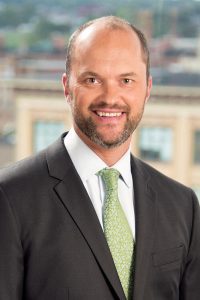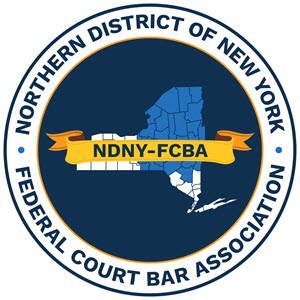Interviewed by Janelle A. Pelli
Gabe Nugent is a familiar face for anyone who’s been involved with the Federal Court Bar Association. Gabe has served as both a trustee and an officer of the FCBA, and been involved in the group’s CLEs, social events, and committee work.
In July 2023, after 17 years at Barclay Damon, Gabe became Senior Vice President and General Counsel at Syracuse University.

In this interview, Gabe discussed the transition from law firm partner to chief legal officer for a large university, as well as his responsibilities in his new job and what he misses about private practice.
1. First, can you tell us about your background as an attorney?
After graduating from Brooklyn Law School, I practiced for seven years in New York City. I started at a boutique startup firm and later moved to the litigation department of Thelen Reid & Priest, a bi-coastal, 600-attorney firm. I worked on a wide variety of commercial litigation in my early years as an attorney, from breach of contract cases to trademark and copyright claims, and securities law. I was fortunate enough to have opportunities to cut my teeth in litigation right away. In fact, I second-chaired a trial my first year out of law school.
I am originally from Watertown, New York. So, after several years of practicing in New York City, I moved back upstate. Central New York gave me an opportunity to replicate my sophisticated practice while getting a better work-life balance. It has also been a great spot to raise my kids. I continued my practice at Barclay Damon for 17 years before transitioning to my current role.
In 2009, I worked on a large matter for Syracuse University. In 2014, one of my partners, Dan French, was asked to serve as interim General Counsel and he asked me to become involved. We thought it would be temporary, but we worked on more and more matters and became more ensconced in the University. Last winter, I was asked to apply to be General Counsel. It was a natural transition from my work as outside counsel for the University.
2. What does the Senior Vice President (SVP) and General Counsel of Syracuse University do?
Under the bylaws, I serve as the legal advisor to Chancellor Kent D. Syverud and the Board of Trustees. More specifically, the General Counsel’s office protects the legal interests of the University. I provide legal advice and respond to lawsuits, but I also anticipate changes to prevent legal risk. In the past three years, there have been more changes to the university landscape than in the prior 30 years.
For example, university athletics have been undergoing hemispheric changes, which are well-reported in the news. These changes raise significant legal questions, such as whether student athletes may be considered employees, the implications of legal agreements for athletic conferences, potential antitrust issues, and other concerns related to student athletes and compensation. With respect to the last issue, some of the focus is currently on NCAA president Charlie Baker’s letter from earlier this month recommending changes that would have been laughed at ten years ago.
In addition to the changing landscape for university athletics, there are widespread changes occurring within higher education at large. The U.S. Department of Education is becoming more involved with regulating higher education than it historically has. All colleges and universities must consider the risks associated with the representations they make about their institutions, including about school ratings, job placement records, and the cost of attendance.
3. What is the most difficult part of your job?
As General Counsel, I try to serve all of the University’s legal needs. The most difficult part of my job is measuring my time, and allocating how best to spend it. Everything comes with risks, so it is important for me to prioritize.
When I was a litigator, I tried to add value by doing more than just billing my time. As General Counsel, part of my role is uncovering the root of problems, even more so than a litigator does. The General Counsel has to investigate and eradicate the causes of those problems, including by making structural changes and training. My job requires me to be proactive in tackling university issues.
4. What professional associations and organizations are you a part of, and how have those groups impacted your career?
I am currently a member of the New York State Bar Association and the Federal Court Bar Association (FCBA). The FCBA has had a very significant impact on my career. It’s a great organization because it does so much to create collegiality and civility. We have many members who have contributed to our profession in Upstate and Central New York. The FCBA is a great way to preserve a professional and dignified legal community.
5. What sort of diversity, equity, and inclusion initiatives have you promoted in your career?
I have always considered diversity a feature in every hiring decision. When I was in firm management and ran the litigation group at Barclay Damon, I considered diversity every time I assigned work. Work is the currency of a law firm. If you want attorneys to have equal opportunity to advance, you need to be thoughtful in how you assign it, and disrupt the norm.
At Syracuse University, the General Counsel’s office is a very diverse group. I am the only male attorney in our office. Although we are a small office made up of only six attorneys, we are seeking to grow and certainly want a diverse candidate pool.
6. Do you miss private practice?
Working at a law firm and at Syracuse University are such different experiences. I loved the firm I worked for and the work that I did – it was a difficult decision to leave. That said, there is something great about working for a university, where the mission is to provide the best possible education for your students, particularly since you can see the product of the institution’s work walking around on campus.
I do miss being a trial attorney. In May, I tried my tenth pro bono Section 1983 civil rights case in the Northern District of New York before Judge Mae D’Agostino – and we won the case. I litigated the case entirely on my own, without any junior attorney or paralegal support. It was a great victory for my client on his excessive force claims. Win or lose, I love those cases. I enjoy helping incarcerated individuals who cannot afford representation in the NDNY by taking what they have started and seeing it through trial.
7. What is the most interesting case you have ever handled?
When I was in private practice, I defended a family-owned business during a criminal investigation and trial for violating the Clean Air Act, and represented them on appeal. The investigation began in 2006, and the matter didn’t resolve until 2015. My client was convicted at trial, but we appealed, and the Second Circuit threw the conviction out. Ultimately, we were able to negotiate a much better result for the client. The case almost broke the company and the individuals who owned it. Yet, the client hung in there through the appeal, and is still operating today. It was such a fascinating experience to be a part of.
8. What do you like to do when you are not working?
I have been involved in youth rugby in Central New York for almost 10 years. My wife and I enjoy hiking and being outdoors. Lately, I have taken up woodworking with some help from my brother, who’s a carpenter. So far, I’ve built a birdhouse, a work bench, and a cedar farmhouse table. I also enjoy planting native plants to restore native habitats around Syracuse.
9. If you were not an attorney, what would your dream job be?
I would either be a rugby coach or someone who helps restore forests and native habitats.

